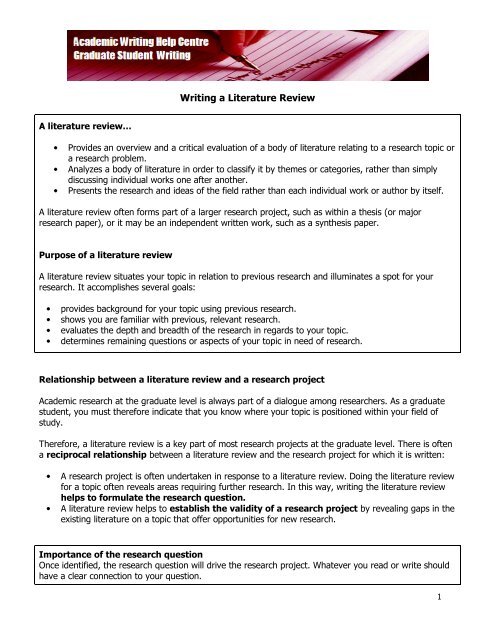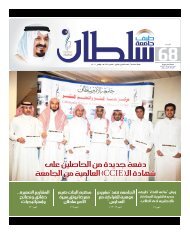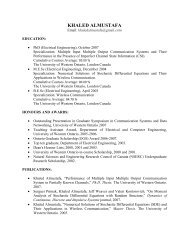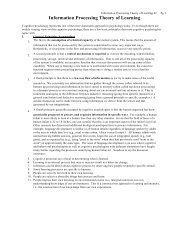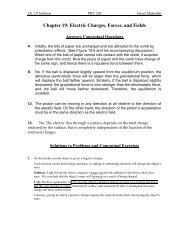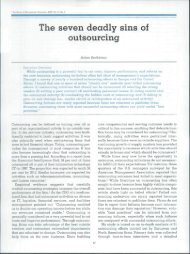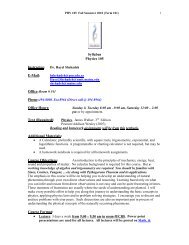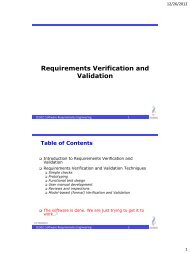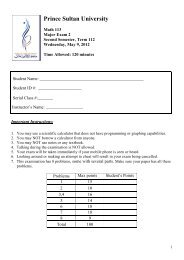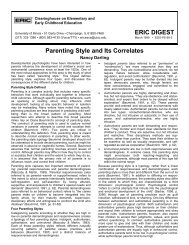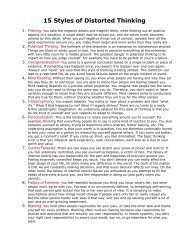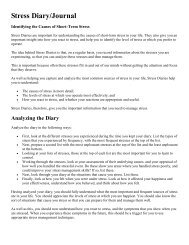Writing a Literature Review - SASS
Writing a Literature Review - SASS
Writing a Literature Review - SASS
You also want an ePaper? Increase the reach of your titles
YUMPU automatically turns print PDFs into web optimized ePapers that Google loves.
<strong>Writing</strong> a <strong>Literature</strong> <strong>Review</strong>A literature review…• Provides an overview and a critical evaluation of a body of literature relating to a research topic ora research problem.• Analyzes a body of literature in order to classify it by themes or categories, rather than simplydiscussing individual works one after another.• Presents the research and ideas of the field rather than each individual work or author by itself.A literature review often forms part of a larger research project, such as within a thesis (or majorresearch paper), or it may be an independent written work, such as a synthesis paper.Purpose of a literature reviewA literature review situates your topic in relation to previous research and illuminates a spot for yourresearch. It accomplishes several goals:• provides background for your topic using previous research.• shows you are familiar with previous, relevant research.• evaluates the depth and breadth of the research in regards to your topic.• determines remaining questions or aspects of your topic in need of research.Relationship between a literature review and a research projectAcademic research at the graduate level is always part of a dialogue among researchers. As a graduatestudent, you must therefore indicate that you know where your topic is positioned within your field ofstudy.Therefore, a literature review is a key part of most research projects at the graduate level. There is oftena reciprocal relationship between a literature review and the research project for which it is written:• A research project is often undertaken in response to a literature review. Doing the literature reviewfor a topic often reveals areas requiring further research. In this way, writing the literature reviewhelps to formulate the research question.• A literature review helps to establish the validity of a research project by revealing gaps in theexisting literature on a topic that offer opportunities for new research.Importance of the research questionOnce identified, the research question will drive the research project. Whatever you read or write shouldhave a clear connection to your question.1
How to write a strong literature reviewThere are several steps toward writing a strong literature review:1. Synthesize and evaluate information2. Identify the main ideas of the literature3. Identify the main argument of the literature review4. Organize the main points of the literature review5. Write literature review1. Synthesize and evaluate informationA literature review requires critical thinking, reading, and writing. You will take the information that youhave gathered through your research and synthesize and evaluate it by indicating important ideas andtrends in the literature and explaining their significance.Strategies for reading• As soon as you begin reading, take note of the themes or categories that you see emerging. Thesemay be used later to develop a structure for the literature review.• Take note of how other writers classify their data, the literature in their fields, etc. It can be helpful toread literature reviews in your discipline to see how they are structured.Categories for analysis and comparisonA strong literature review examines each work on its own and in relation to other works byidentifying and then analyzing them with regards to a number of different research aspects and ideas.Here are some possible categories to use for comparison and analysis.topicargumentresults found and conclusionsmethodstheoretical approachkey wordsOverall, a literature review seeks to answer the following questions:• What does the literature tell you?• What does the literature not tell you?• Why is this important?Questions for analyzing individual works- What is the argument? Is it logically developed? Is it well defended?- What kind of research is presented? What are the methods used? Do they allow the author toaddress your research question effectively? Is each argument or point based on relevant research?If not, why?- What theoretical approach does the author adopt? Does it allow the researcher to make convincingpoints and draw convincing conclusions? Are the author’s biases and presuppositions openlypresented, or do you have to identify them indirectly? If so, why?- Overall, how convincing is the argument? Are the conclusions relevant to the field of study?Questions for comparing works- What are the main arguments? Do the authors make similar or different arguments? Are somearguments more convincing than others?- How has research been conducted in the literature? How extensive has it been? What kinds of data2
have been presented? How pertinent are they? Are there sufficient amounts of data? Do theyadequately answer the questions?- What are the different types of methodologies used? How well do they work? Is one methodologymore effective than others? Why?- What are the different theoretical frameworks or approaches used? What do they allow the authorsto do? How well do they work? Is one approach more effective than others? Why?- Overall, is one work more convincing than others? Why? Or are the works you have compared toodifferent to evaluate against each other?The Academic <strong>Writing</strong> Help Centre offers more information on synthesis and evaluation in the discussiongroup and accompanying handout on Information Management for a <strong>Literature</strong> <strong>Review</strong>.2. Identify the main ideas of the literatureOnce you have begun to synthesize your research, you will begin to identify some main ideas and trendsthat pervade the topic or that pertain to your research question.Use these main ideas to classify the information and sources that you have read. Later, these ideas canbe used as the main topics of discussion in the literature review, and if you have already organized yourliterature on these topics, it will be easy to summarize the literature, find examples, etc.3. Identify the main argument of the literature reviewJust like any academic paper, the literature review should have a main idea about the literature that youwould like the readers to understand. This argument is closely related to your research question in that itpresents a situation in the body of literature which motivates your research question.ExampleArgument from a literature review: “Although some historians make a correlation between the Ukrainian Catholicand Orthodox churches and the retention of Ukrainian culture and language by Ukrainian immigrants in Canada,little has been said of the role of the Roman Catholic Church in the development of Ukrainian communities inCanada.”Research question: “How has the Roman Catholic Church shaped Ukrainian-Canadian identity?”4. Organize the main points of the literature reviewAfter identifying the main ideas that need to be presented in the literature review, you will organize themin such a way as to support the main argument. A well-organized literature review presents the relevantaspects of the topic in a coherent order that leads readers to understand the context and significance ofyour research question and project.As you organize the ideas for writing, keep track of the supporting ideas, examples, and sources that youwill be using for each point.5. Write the literature reviewOnce the main ideas of the literature review are in order, writing can flow much more smoothly. Thefollowing tips provide some strategies to make your literature review even stronger.3
Give structure to the literature review.Tips for <strong>Writing</strong> and PresentationLike any academic paper, a literature review should contain an introduction, a body and a conclusion,and should be centered on a main idea or argument about the literature you are reviewing.If the literature review is a longer document or section, section headers can be useful to highlight themain points for the reader. However, the different sections should still flow together.Explain the relevance of material you use and cite.It is important to show that you know what other authors have written on your topic. However, youshould not simply restate what others have said; rather, explain what the information or quoted materialmeans in relation to your literature review.• Is there a relevant connection between a specific quote or information and the correspondingargument or point you are making about the literature? What is it?• Why is it necessary to include this piece of information or quote?Use verb tenses strategically.• Present tense is used for relating what other authors say and for discussing the literature,theoretical concepts, methods, etc.“In her article on biodiversity, Jones stipulates that ….”In addition, use the present tense when you present your observations on the literature.“However, on the important question of extinction, Jones remains silent.”• Past tense is used for recounting events, results found, etc.“Jones and Green conducted experiments over a ten-year period. They determined that it was notpossible to recreate the specimen.”BibliographyBell, Judith. Doing Your Research Project: A Guide for First-time Researchers in Education, Health and Social Science.Maidenhead, Berkshire: Open University Press, 2005.Boote, David N. and Penny Beile. “Scholars before researchers: On the centrality of the dissertation literature review in researchpreparation.” Educational researcher, 34.6 (2005): 3-15.Booth, Wayne C., Gregory G. Colomb, and Joseph M. Williams. The Craft of Research. Chicago: University of Chicago Press,2003.Verma, Gajendra K. and Kanka Mallick. Researching Education: Perspectives and Techniques. London: Falmer Press, 1999.The <strong>Writing</strong> Center, University of North Carolina – Chapel Hill. <strong>Literature</strong> <strong>Review</strong>s. Chapel Hill, NC. 2005. Availablehttp://www.unc.edu/depts/wcweb/handouts/literature_review.html.© 2007 Academic <strong>Writing</strong> Help Centre, University of Ottawawww.sass.uottawa.ca/writing 613-562-5601 cartu@uOttawa.ca4


